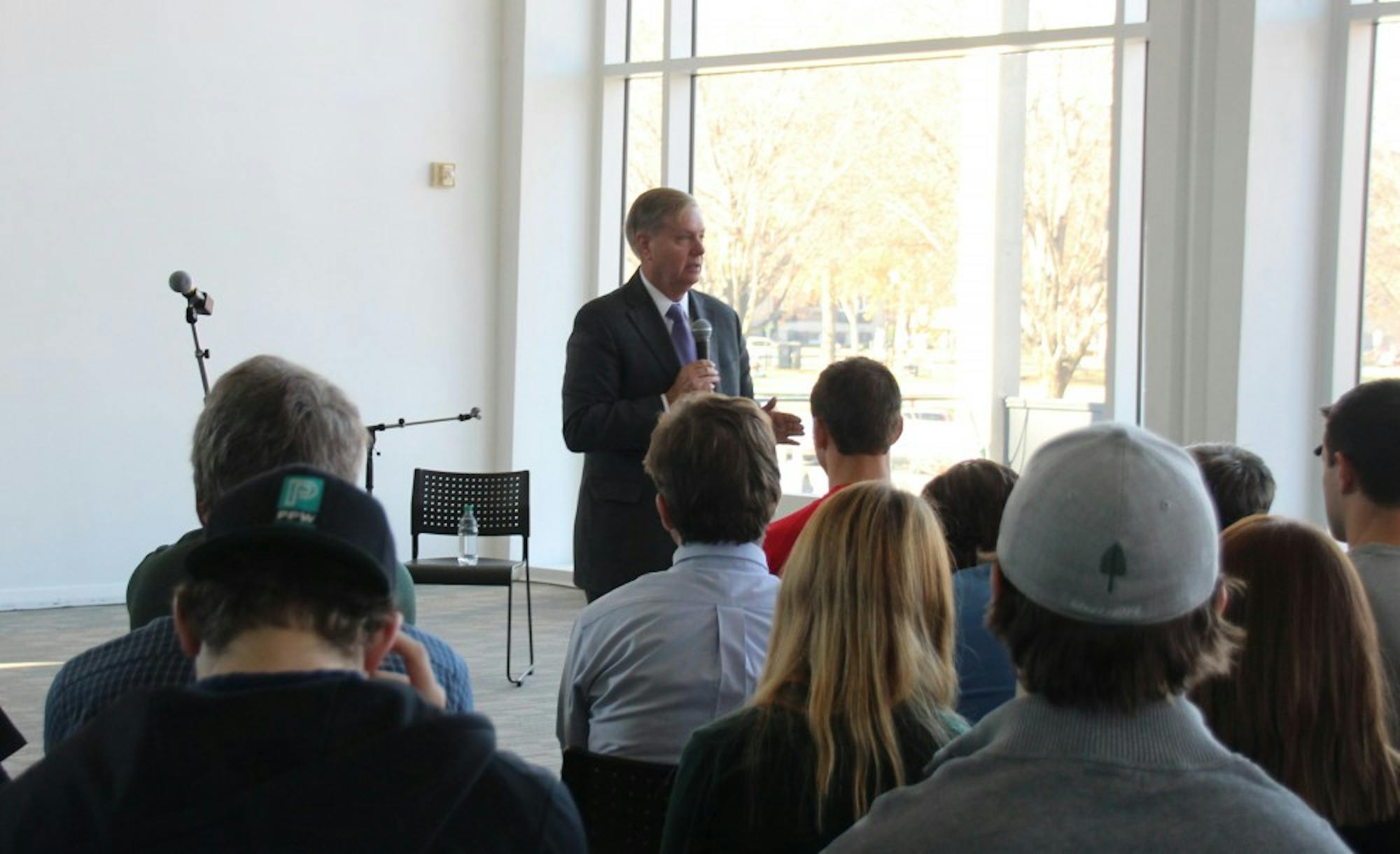Senator Lindsey Graham (R-S.C.) joked, “This is the only way I could get into an Ivy League School — by running for president,” at a town hall meeting Wednesday afternoon. Graham is the second presidential candidate to be featured in “America’s Economic Future,” a lecture series co-sponsored by the Tuck School of Business and the Rockefeller Center.
At the event — held at the Top of the Hop — Graham spoke about his early life, his military and public service career and his views on foreign policy and America’s economic standing.
Graham concentrated on the importance of American leadership in foreign policy. The greatest threat America faces is radical Islam since the war being fought by extremists is an attempt to purify their own faith and eliminate all other faiths, he said.
The aspirations of young people in the Middle East are similar to those of Americans, Graham said. Most fathers and mothers in the Middle East do not want to give their children away to the Islamic State, he said. Graham said the solution to the problem lies in military campaigns as well as education and empowerment of the youth.
“This is going to be a long, hard fight,” Graham said. “But we’re on the right side of the fight.”
Graham cited anti-American and anti-Western rhetoric as evidence of an existential threat posed by the Islamic State.
The civil war in Syria is a major issue for American national security because of the nation’s strategic and central location in the Middle East, Graham said, adding that Syrian President Bashar al-Assad’s regime — if it stays in power — will guarantee regional instability and a protracted, endless war in the Middle East.
The only way to destroy the Islamic State and Assad involves employing a ground campaign in Syria, he said. To cripple the Islamic State in Syria, Graham proposed introducing a no-fly zone — so affected people do not feel obliged to leave Syria — training the Free Syrian Army and creating a regional alliance with forces from a wide variety of Middle Eastern countries.
The new coalition’s forces should then remain in Syria and force Assad out of power, Graham said.
“The enemy offers glorious death. I intend to create hopeful life,” he said.
Graham linked the ability of the United States to defeat its enemies with the country’s current economic situation. The U.S. national debt could undermine efforts to combat Islamic extremism, he said.
Sintha Rajasingham Tu’16 said she attended the event because she hopes to find a candidate to support in the upcoming election. She believes that one of the most pressing issues facing the country today is the threat posed by the Islamic State and had heard Graham was one of the foremost experts on foreign policy within Congress.
Mitzi Sampson, a community member, said she hoped to hear Graham’s thoughts on economics to gain a broader understanding of his platform, as Graham’s foreign policy positions usually receive more attention.
Though Graham did not discuss specific economic policies, he proposed delaying the Social Security retirement age. Deregulating the American economy slightly would allow the country to prosper, he added.
Graham answered questions relating to Israel and a two-state solution.
Graham also said he would not urge Israel to adopt a peace deal until Hamas is marginalized or changed within the Gaza Strip, explaining that while he yearns for peace in the Middle East, Hamas indoctrinates its youth with hatred of the Israelis and has continuously launched thousands of rockets into Israel. If elected, Graham would refuse to pressure Israel to sign a “suicide pact” that he believes would threaten the Jewish state, he said.
“As to Israel, I’ll have their back,” Graham said.
Graham also fielded questions on immigration reform in the United States.
The senator proposed a modified version of amnesty for undocumented immigrants through which they would be required to pay a fine for entering the country illegally, pay taxes, pass an English proficiency exam and wait “at the back of the line” for a green card.
“I promise you, if I get to be president of the United States, we’re going to fix immigration once and for all,” Graham said. “We’re going to be firm, and we’re going to be fair.”
Graham stressed the need for bipartisan compromise in American politics, citing his own record working across the aisle on immigration policy, Social Security and student loans. The differences between Graham’s positions and those of many within the Republican Party can be traced to his upbringing, he said.
The senator grew up living in a single room behind his family’s liquor store and bar. He was the first in his family to attend college and raised his younger sister following his parents’ deaths while he was still in school, he said.
Since his own family benefited from student loan programs and government benefits, Graham said he believes such programs can be essential for realizing the American Dream.
“I’m a Republican, proud of it, but there’s a role for the government,” Graham said. “I am running as a Republican, but I will govern as an American.”
This ability to be bipartisan without compromising personal ideals is highly appealing to Sandor Farkas ’17, a Graham supporter.
“What I see in Lindsey Graham is someone who has often worked with Democrats to achieve things, to actually get things done in Washington,” he said.
While Graham’s support of moderate positions is a highly attractive factor for some students, others believe that the eventual Republican nominee needs to be consistently conservative in order to unite the party’s base.
To win the primaries, Republican presidential candidates should be pro-life, pro-gun and opposed to amnesty for undocumented immigrants, College Republicans vice president Brian Chen ’17 said.
“Graham is extremely unpopular among pretty much everyone [because] he takes positions that are so abhorrent to the base of the Republican Party,” Chen said. “He has a record of intentionally antagonizing and insulting the base of the party. He has deliberately angered and annoyed the people he needs to appeal to.”
Graham’s bipartisanship can be his greatest weakness — rather than a strength — because Graham has not worked across aisles so much as he has capitulated to Democrats, Chen said.
“There are many senators who work across the aisle and who are problem solvers, but they don’t deliberately insult the elements of their party, and they don’t deliberately scorn those elements of their own party, and they hold conservative values,” he said.
Graham’s appearance in the second-tier debates — rather than the debates including the major leading candidates — has likely kept him from being perceived as a viable contender, government professor and electoral politics expert Dean Lacy said. While history has provided examples of candidates emerging as frontrunners later in the race, candidates as far behind as Graham usually do not stand a chance of winning, Lacy said.
Nevertheless, the digital age is making it easier for candidates to advertise, helping Graham stay relevant, he said.
“All of the candidates are getting more free media than they would if the available media was constrained to a 30-minute evening news program, where maybe five minutes would be devoted to the presidential race and only a few candidates would get coverage,” Lacy said.
In order for Graham to advance in the polls, he needs to stand out, stay in the debates and raise money, Lacy said. Moreover, Lacy said Graham should seek to emphasize his breadth of knowledge and extensive experience in government.
Graham sat in the House of Representatives for four terms before his election to the Senate, where he is now in his third term. Additionally, Graham has served in the military for more than 30 years, including almost seven years on active duty.
In order to be competitive in later primary states, Graham should focus on building up a base of support in Iowa and New Hampshire, Lacy said.
“He has to survive through New Hampshire in the top tier so that he looks like a legitimate contender moving into Super Tuesday and the Southern primaries,” Lacy said.
Presidents need to be able to work effectively across the aisle, government professor Eric Svensen said.
Since Graham has been a leader in many notable bipartisan projects during his time in Congress — including the “Gang of Eight” that allied across the aisle to propose an immigration reform law — he might be more willing to work with Democrats as president, Svensen said.
Graham’s support for some social welfare programs and high defense spending poses a philosophical challenge as he is seeking to represent a party that supports limited government, Svensen said. While Graham’s conflicting views will put him at odds with the Republican Party during the primaries, such views would actually help him in a general election, particularly by endearing him to independent voters, Svensen said.
Dartmouth faculty thought to capitalize on candidates’ frequent visits to New Hampshire by inviting them to speak at the College, providing an educational opportunity for students at Dartmouth and Tuck to listen firsthand to presidential contenders, former New Hampshire Governor John Lynch, a fellow at Tuck’s Center for Global Business and Government, said.
Lynch said students, faculty and local voters can gain a sense of the candidates’ personalities as well as their policies. Additionally, meeting candidates can elucidate the process of running for president, including its challenges, he said.
There is a value to bringing all candidates of both parties to Dartmouth, Farkas said. Graham’s views in particular can demonstrate to students that amidst many polarizing voices, a middle-of-the-road perspective exists within the Republican Party, he added.
While all Republican and Democratic candidates have been invited to speak in the America’s Economic Future series, only former New York governor George Pataki and Senator Graham have spoken thus far. Former Secretary of State Hillary Clinton is slated to speak next week.
Coming to Dartmouth and Tuck is on all of the candidates’ radar screens, but trying to schedule their visits can be difficult because candidates have demands on their time from a variety of constituencies, Lynch said.
“Scheduling these presidential candidates is like trying to put together a 4,000 piece jigsaw puzzle, and the pieces are changing all the time,” he said.




